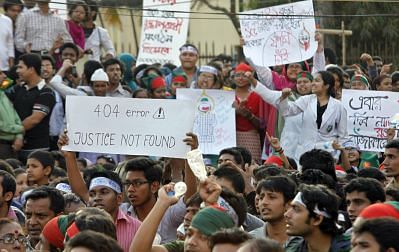The youth and their demand

Photo: STAR
The youth who have grown up since 1990 seem to be the leading actors and participants in the programme that started from the Shahbagh crossroads and has now spread all over Bangladesh. The fact that it was started and is being carried on mostly by a generation that came into consciousness after 1990 is significant. Unlike the previous generations who were subject to biased propaganda and information, this generation has had more access to information and freedom to share it, and to ascertain the facts from the different points of view.
Some people say that the young should raise their voice against rampant corruption and other deficiencies in governance instead of fixating on an issue that is 41 years old and causes considerable discomfort among people of a certain bias. They miss the whole point of this spark. The reason that the youth have galvanised around the issue of trial of war criminals is directly related to addressing the issues of corruption and immunity for criminals in our society.
The reason they have singled out this issue to pursue is that when they took in all the information from the last 41 years regarding Bangladesh they realised that the whole culture of immunity for criminals began with the release and establishment of the collaborators. They have rightly pinpointed the fact that once society saw that the people who openly committed criminal acts against the whole nation were not only let off the hook but were also rewarded with power over the same nation that fought to get rid of them has traumatised the nation into a cynical state where justice is no more. This, the youth of today see as the starting point of the slippery slope of decay that has so far plagued the nation. As time, technology and economy have now presented them an opportunity to correct the wrong and thus bring an end to the culture of immunity for criminals, they have started their work.
Of course, the two very powerful political parties of Bangladesh will try to use this to their advantage. And, unfortunately, they might succeed for the short term. Awami League has an upper hand in it as it was the leader of the Bangladesh freedom struggle and was at the receiving end of the atrocities committed by the collaborators in 1971; even though it had in the recent past made certain political alliances for electoral gain.
On the other hand, the BNP as a party started with a group of NAP supporters who were at first Maoists and then turned to quasi-Islamic socialists, and everyone else in between who stood to gain from opposing Awami League -- chief among them being the collaborators who were banned or banished from this country. That during the time of the BNP's founder the collaborators were not only let off the hook but also established in society aroused the current generation, who have a clearer vision unclouded by any personal affiliations.
On top of that, the association of different kinds of forces of fundamentalism with BNP is not seen as a positive attribute as in the current world situation it does not help the younger educated generation in terms of economic opportunities. As such the BNP finds itself in a defensive position at the moment.
On the surface, the issue here might be the trial of collaborators of 1971, but it leads to the broader issue of the culture of immunity for criminals and the corrupt and the economic future of the young and the educated of Bangladesh.

 For all latest news, follow The Daily Star's Google News channel.
For all latest news, follow The Daily Star's Google News channel. 



Comments